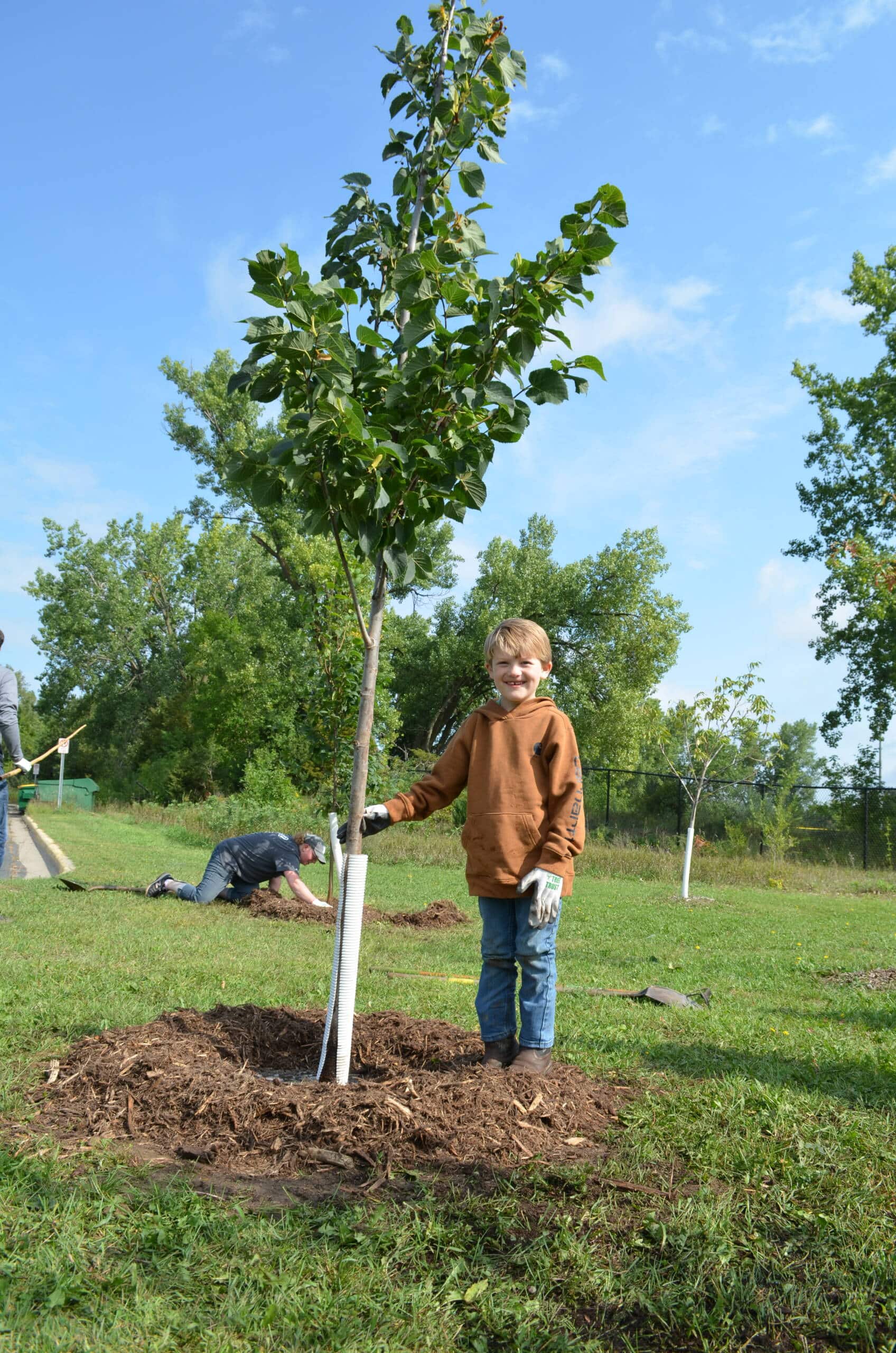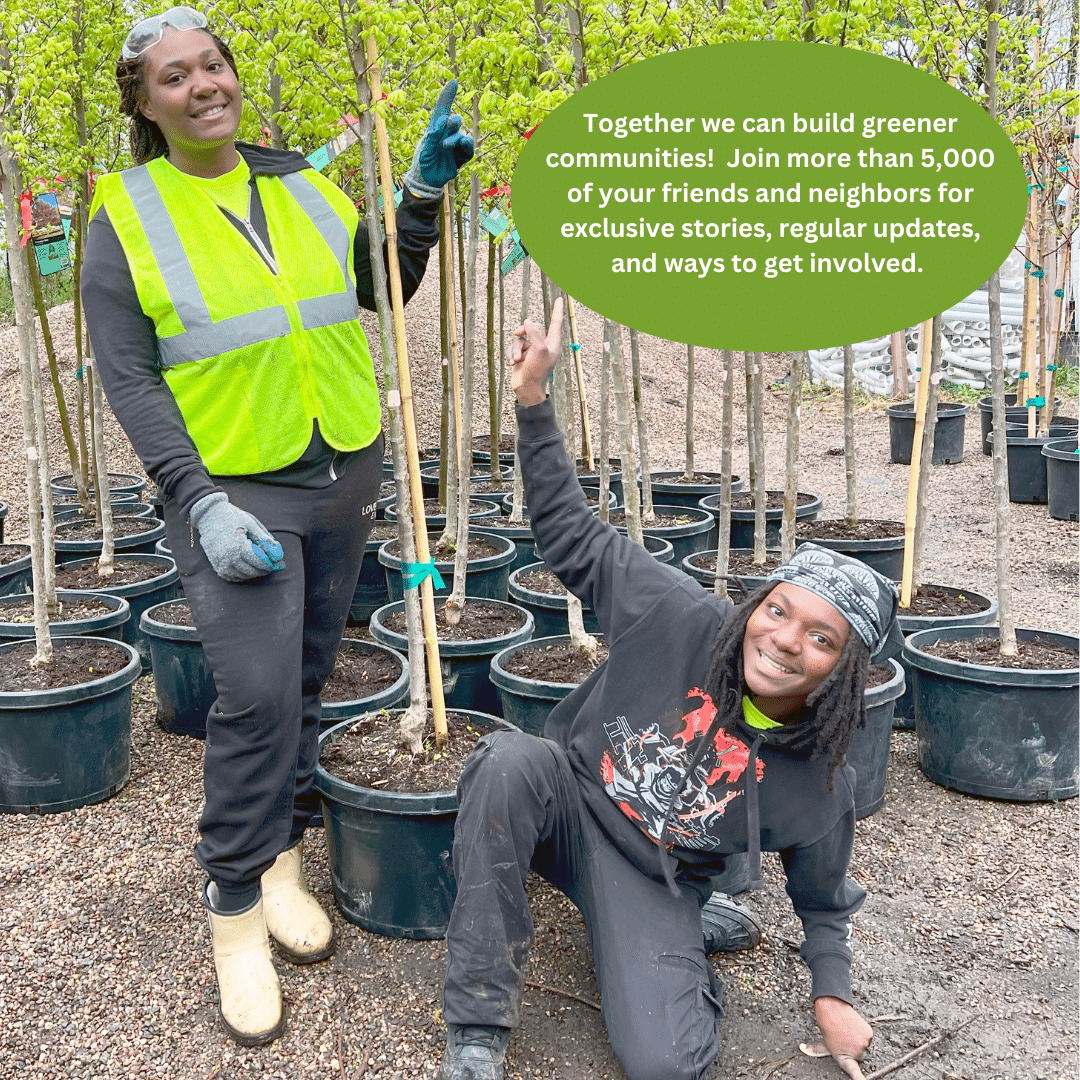
Trees Make You Feel Good: Plant Trees for A Greener Future
Since 1976, Tree Trust has engaged Minnesota communities to plant more trees. In 2022, we achieved the amazing results of 5,937 trees planted and the engagement of 833 volunteers.
Individual donors helped make all this possible by partnering to plant trees through gifts to Tree Trust’s Green Futures program. This year, a generous Green Futures donor has pledged to match — dollar for dollar — every gift up to $10,000! With your help, Tree Trust will plant 7,000 trees in 2023. Our Community Forestry team will host planting events and tree distributions in partnership with local municipalities. Our Learning with Trees™ program will deliver quality environmental education to Twin Cities schools, planting trees with students on school campuses. We could not do this important work without the generosity of donors supporting a vibrant green future.
The Facts: Trees Make You Feel Good
One reason we plant trees is because trees make you feel good. We aren’t just saying this. Research shows that trees provide a multitude of benefits that make us feel good — physically, mentally, and emotionally. According to a recent article from Yale University, “Researchers have identified a plethora of physical and mental health benefits that come along with planting more trees in urban areas … [discovering] that exposure to urban forests generally reduces mental and physical stress, anxiety, and depression, and [improves] moods.” Trees are nature’s prescription for good health.
Trees Are a Prescription for a Healthier You
How do trees make you feel good? This is a question that leading research scientist Dr. Kathleen L. Wolf has been exploring through the observation and analysis of human behavior, with a focus on people and trees in urban environments. Dr. Wolf has summarized her research, including many other studies, to create this list of “fast facts” explaining how trees make you feel good.

*Grow Healthy with More Trees: Positive Impact of Trees
- Urban environments, when provided as access to nature and incorporated into building design, provide calming and inspiring environments, and encourage learning, inquisitiveness, and mental wellbeing.
- Green spaces provide necessary places and opportunities for physical activity. Exercise improves physical health, cognitive function, learning, and memory.
- Outdoor activities can help alleviate symptoms of Alzheimer’s, dementia, stress, and depression, and improve cognitive function in those recently diagnosed with breast cancer.
- Contact with nature helps children to develop cognitive, emotional, and behavioral connections to their nearby social and biophysical environments. Nature experiences are important for encouraging imagination and creativity, cognitive and intellectual development, and social connection.
- Symptoms of ADD in children can be reduced through activity in green settings, thus “green time” can act as an effective supplement to traditional medicinal and behavioral treatments.
*Accessed from https://depts.washington.edu/hhwb/Thm_Mental.html
Urban Green Spaces: Spending Time Under The Canopy
Trees reduce carbon, create oxygen, filter our water, and provide shade. But this is merely the tip of the crown. Research shows that people who live in neighborhoods with green spaces are more active. According to The National Library of Medicine, “Residents of areas with the highest levels of greenery were three times as likely to be physically active and 40% less likely to be overweight or obese, than those living in the least green settings.” Urban green spaces encourage physical activity for many, offering a place to exercise and promoting a healthy lifestyle without an expensive gym membership. Exercise is a great way to feel good physically. In addition, trees can also make you feel good mentally. A relaxing walk in a forested area is a great way to boost positive emotions.
Indeed, just basking in the presence of trees is enough to percolate feelings of joy. Dr. Wolf champions this idea. She states, “Across multiple studies, negative feelings decrease, and positive emotions increase. Forest walking within urban parks was found to ease acute emotions (such as boredom and depression), and the higher the self-reported stress level, the greater the positive effect.” In conclusion, trees make you feel good!
Tree Trust knows that greener futures are possible if we all work together. The invasive pest emerald ash borer is threatening the health of our urban canopy and the time to plant more trees is now. Donate today for your gift to be doubled — and help us plant more trees for a greener, more vibrant tomorrow.


